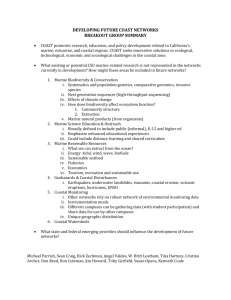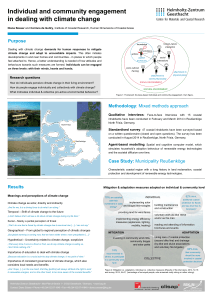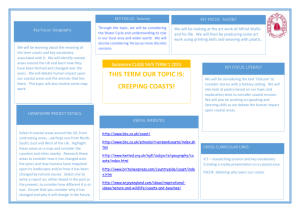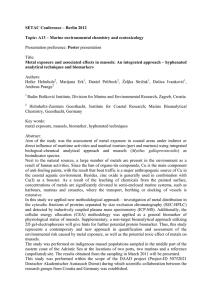Theme 4
advertisement
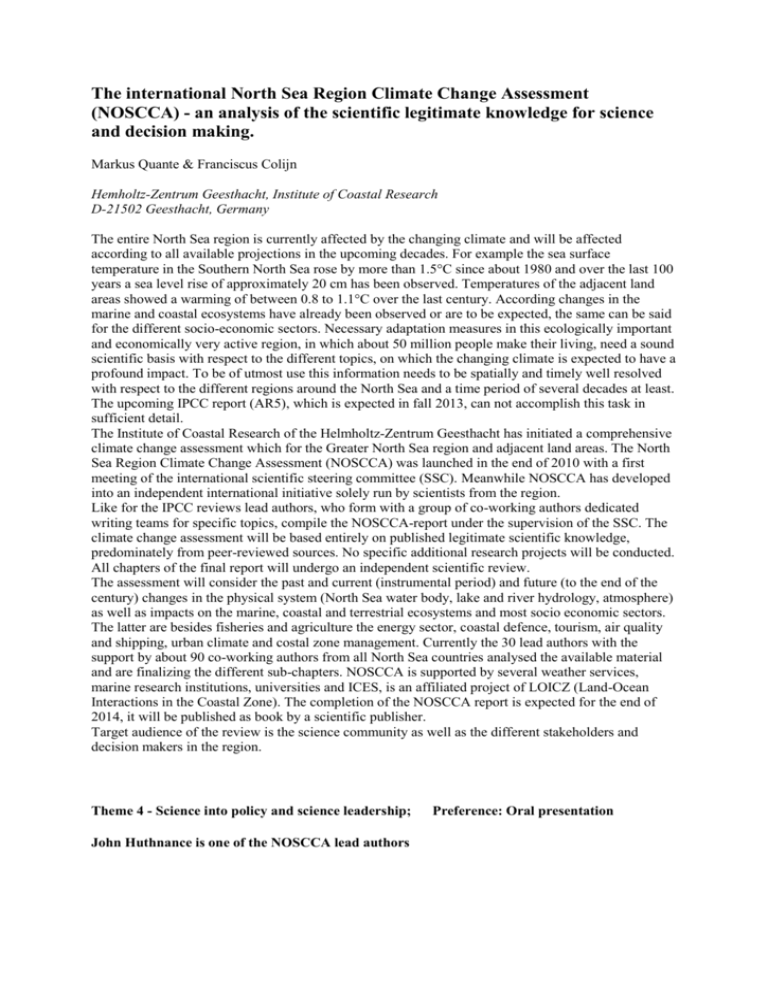
The international North Sea Region Climate Change Assessment (NOSCCA) - an analysis of the scientific legitimate knowledge for science and decision making. Markus Quante & Franciscus Colijn Hemholtz-Zentrum Geesthacht, Institute of Coastal Research D-21502 Geesthacht, Germany The entire North Sea region is currently affected by the changing climate and will be affected according to all available projections in the upcoming decades. For example the sea surface temperature in the Southern North Sea rose by more than 1.5°C since about 1980 and over the last 100 years a sea level rise of approximately 20 cm has been observed. Temperatures of the adjacent land areas showed a warming of between 0.8 to 1.1°C over the last century. According changes in the marine and coastal ecosystems have already been observed or are to be expected, the same can be said for the different socio-economic sectors. Necessary adaptation measures in this ecologically important and economically very active region, in which about 50 million people make their living, need a sound scientific basis with respect to the different topics, on which the changing climate is expected to have a profound impact. To be of utmost use this information needs to be spatially and timely well resolved with respect to the different regions around the North Sea and a time period of several decades at least. The upcoming IPCC report (AR5), which is expected in fall 2013, can not accomplish this task in sufficient detail. The Institute of Coastal Research of the Helmholtz-Zentrum Geesthacht has initiated a comprehensive climate change assessment which for the Greater North Sea region and adjacent land areas. The North Sea Region Climate Change Assessment (NOSCCA) was launched in the end of 2010 with a first meeting of the international scientific steering committee (SSC). Meanwhile NOSCCA has developed into an independent international initiative solely run by scientists from the region. Like for the IPCC reviews lead authors, who form with a group of co-working authors dedicated writing teams for specific topics, compile the NOSCCA-report under the supervision of the SSC. The climate change assessment will be based entirely on published legitimate scientific knowledge, predominately from peer-reviewed sources. No specific additional research projects will be conducted. All chapters of the final report will undergo an independent scientific review. The assessment will consider the past and current (instrumental period) and future (to the end of the century) changes in the physical system (North Sea water body, lake and river hydrology, atmosphere) as well as impacts on the marine, coastal and terrestrial ecosystems and most socio economic sectors. The latter are besides fisheries and agriculture the energy sector, coastal defence, tourism, air quality and shipping, urban climate and costal zone management. Currently the 30 lead authors with the support by about 90 co-working authors from all North Sea countries analysed the available material and are finalizing the different sub-chapters. NOSCCA is supported by several weather services, marine research institutions, universities and ICES, is an affiliated project of LOICZ (Land-Ocean Interactions in the Coastal Zone). The completion of the NOSCCA report is expected for the end of 2014, it will be published as book by a scientific publisher. Target audience of the review is the science community as well as the different stakeholders and decision makers in the region. Theme 4 - Science into policy and science leadership; John Huthnance is one of the NOSCCA lead authors Preference: Oral presentation


